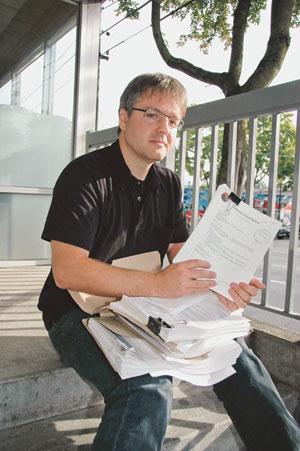Educator Glen Hansman is skeptical about BC’s new Erase Bullying program.
Hansman, who met with representatives from the program in September, doesn’t think it will address homophobia in schools comprehensively.
“I get the sense that things are going to be touched on, but there isn’t the intent to go in-depth,” he says.
The province has contracted J Kevin Cameron, of the Canadian Center for Threat Assessment and Trauma Response, and Theresa Campbell, of Safer Schools Together, to implement the program. Their focus, Hansman says, is based largely on risk assessment.
Premier Christy Clark unveiled the $2 million 10-point strategy June 1. Addressing homophobic bullying is “going to be a big part of the program,” she said in announcing the initiative at a Surrey YMCA.
But the program doesn’t really address what schools can do to build queer-friendly schools proactively, Hansman says.
It’s a marked difference from the kind of comprehensive training offered to specifically support the Vancouver School Board’s anti-homophobia policy adopted in 2004, notes Hansman, a former consultant in the district.
Hansman says the bulk of Cameron’s presentation dealt with North American research on school violence, homicidal ideation, suicidal ideation in the general community, and how service providers succeed or fail in assessing and responding to situations as they occur.
The province intends to establish risk-assessment requirements for all school districts, Hansman says. “All of that is very important for school districts and schools to have protocols to handle these,” he agrees. But he was hoping to see more attention paid to prevention through culture change, rather than merely reacting to threats and attempting to defuse them one by one.
In a break from a training session in Dawson Creek on Oct 29, Campbell says the strategy’s focus is to train school professionals to assess what bullying is and to identify its different forms.
“If we are to be successful with our assessment and intervention, we have to be able to have the ability to break down the different types of bullying,” she says.
Campbell says homophobia was identified during consultations with school professionals and students prior to developing the training materials now being rolled out across the province. “Some of the kids that talked about homophobia and racism being a significant issue for them in their schools were also saying they hadn’t reported it to adults in the building.”
Asked how Erase Bullying will build queer-friendly schools, Campbell says it’s difficult to say what strategies will be developed beyond this stage to address that. But she is confident that homophobia will be addressed.
“Is it comprehensive enough? I think I’d have a better understanding once we’re able to see the evaluation of some of the work that’s been done. It’s a very important subject,” she says.
Asked if there will be a curriculum component, Campbell says she doesn’t know if “we’re there yet,” but says there is a sense that people want more. “Whether that needs to take the shape of a curricular form or not, I think it’s a little too early to say yet.”
Hansman also notes there was some acknowledgment that the ministerial order governing the provincial standards for codes of conduct hasn’t been properly implemented. “They spoke about ‘tightening up’ to make sure all schools had something that was in compliance, that human rights code piece was important to mention,” he says, noting there was no indication how that was going to be enforced.
Campbell confirms there was an announcement made as part of the Erase strategy that the education ministry would be strengthening the language in codes of conduct, explicitly around the the prohibition of discrimination based on sexual orientation among other factors. “I know there’s going to be a policy table that is going to be meeting to talk specifically about what exactly that looks like.”
She says there hasn’t been a lot of followup with districts to “make sure what we wanted to see implemented, was implemented throughout the province.
“Research is very clear that the role of the code of conduct is very important in our schools. It does make a difference on behaviour when kids have a clear understanding around the expectations for respectful behaviour, but also around the consequences for behaviour,” Campbell says.
And even if the codes are posted in the schools, Campbell says she wants to know if staff, parents and students know what they are.


 Why you can trust Xtra
Why you can trust Xtra


